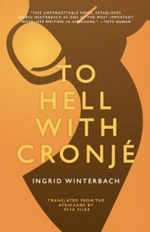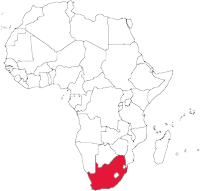

Open Letter, paperback, 9781934824306
 To Hell With Cronjé is Ingrid Winterbach's literary examination of one of the turning points of
South African history: the Second Boer War of 1899-1902. The wars between Britain and the fledgling, and
doomed, Boer nation have been largely ignored in English language literature, certainly in novels that
are readily available in the UK. The focus has been, perhaps understandably, on the political and
social upheavals of the apartheid era. Winterbach, who formerly published under the name 'Lettie Viljoen'
has produced a raw and painful novel which examines the effects of the defeat of the Boers, an event which
established the framework for the subsequent 100 years of troubled history in South Africa.
To Hell With Cronjé is Ingrid Winterbach's literary examination of one of the turning points of
South African history: the Second Boer War of 1899-1902. The wars between Britain and the fledgling, and
doomed, Boer nation have been largely ignored in English language literature, certainly in novels that
are readily available in the UK. The focus has been, perhaps understandably, on the political and
social upheavals of the apartheid era. Winterbach, who formerly published under the name 'Lettie Viljoen'
has produced a raw and painful novel which examines the effects of the defeat of the Boers, an event which
established the framework for the subsequent 100 years of troubled history in South Africa.
The novel follows two disaffected Boer guerillas, Reitz Steyn and Ben Maritz, who have been given leave to accompany Abraham, a severely shell-shocked soldier, back to his home. On the way through the wilderness they stumble across a camp that is manned by similarly damaged and marginalised guerrilla fighters. Steyn and Maritz are treated with suspicion, and are accused of being spies and deserters, particularly by the resentful and angry Gert Smal, a soldier who is witnessing the failure of his Boer cause and is looking for someone to blame. The newcomers are also scientists, which causes friction with the deeply religious Boers. To Hell With Cronjé looks at the relationships between these men, their beliefs and their hopes for the future, and, by implication, the nature of the nation that they are trying to build.
Winterbach's novel is a beautifully crafted examination of a war that shaped the modern South Africa. The blurb contains the inevitable (for an African novel) comparison to Heart of Darkness. There is perhaps more justification for comparing To Hell With Cronjé with Conrad's book than is usually the case. Steyn and Maritz are removed from their normal lives by the war, but are also removed from their fellow guerillas by their lack of religious faith. The two men are lost in their own country, unable to recognise 'home' in anything they see, and unsure what will be left of their homes and families when they eventually find them. Winterbach uses Maritz's and Steyn's scientific observations to describe the hills, valleys and wildlife in South Africa's wide open spaces, but simultaneously gives her books a cramped, claustrophobic feel, as the two men's nation shrinks into the tiny, bewildering camp and its damaged inhabitants. The narrative walks the fine line between being a story of two friends trying to find their way home, to recording one of the painful birth pangs of a sometimes dysfunctional nation.
There are many reasons to read this book. Winterbach's writing sets the mood brilliantly, and she pitches her
blend of characters perfectly to create an uneasy, occasionally frightening feel to her narrative. The camp
in the wilderness occasionally feels like an outer circle of Dante's hell, but she achieves this without
being over-dramatic in her prose. Her story explores an aspect of South African history that has been largely
forgotten. I have read novels by several South African writers, but To Hell With Cronjé felt removed both in
chronology and style from all of them, and felt all the more special because of it. It is a novel that will
stay in my memory for a long time.
